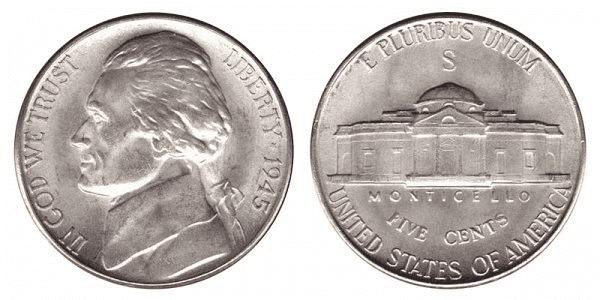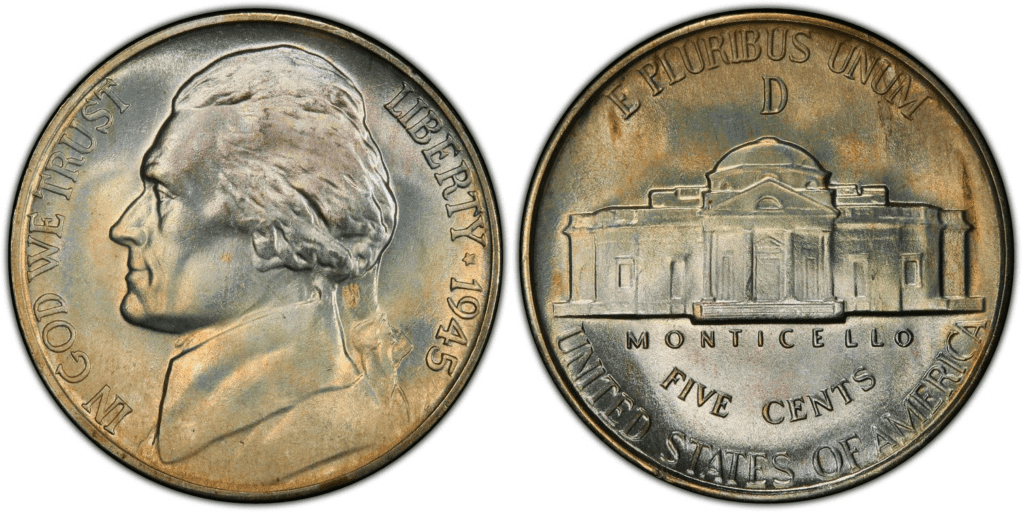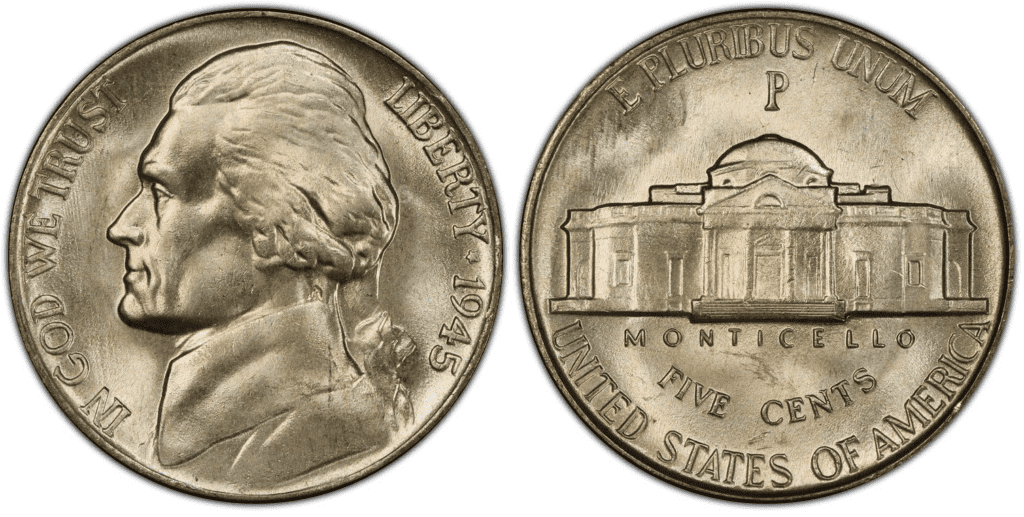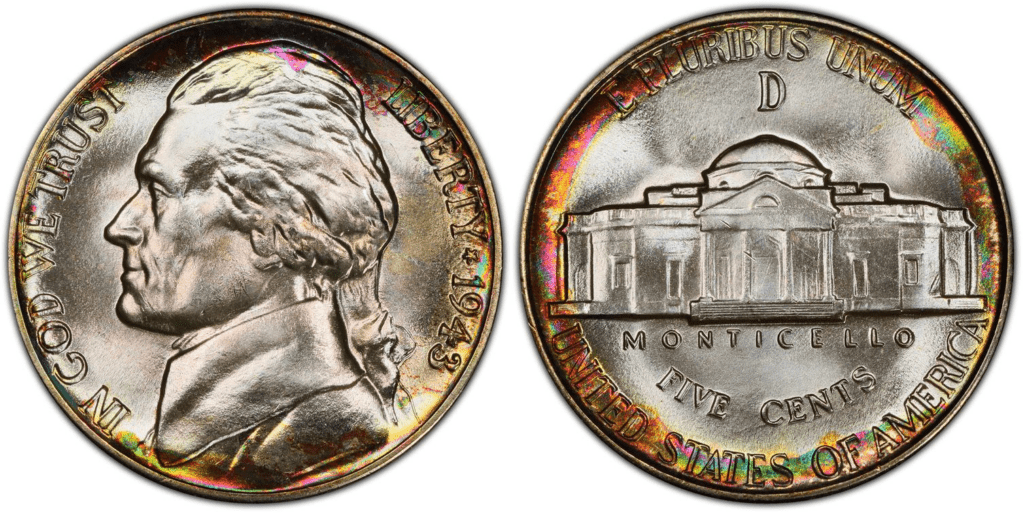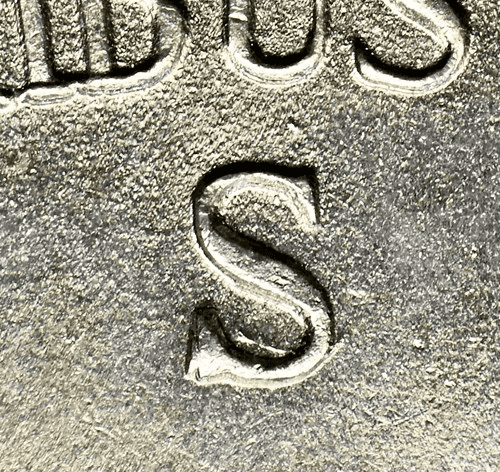What Is the 1945 Jefferson Nickel Made Of?
The United States was engaged in World War II when the 1945 nickel was issued. The war affected how nickel was produced, particularly in its composition. Thus, from mid-1942 to 1945, nickel was made of 56% Copper, 35% Silver, and 9% Manganese. Before 1942 and after 1945, nickel was made of 75% copper and 25% nickel.
The reason for changing the metal composition of the nickel coin during the war was that copper and nickel were important raw materials in making weapons. With the increased demand for the metal nickel on the battlefield, Congress asked the US Mint to change the nickel’s metals to 50% copper and 50% silver. However, Congress gave the Mint the authority to change metal proportions.
The US Mint needed to find a way to make nickel coins that would also satisfy counterfeit detectors. Thus, they came up with a combination of copper, silver, and manganese.
Aside from the composition, there are also other specifications you need to know. These are the following:
- Value – 5 cents
- Diameter – 21.20 millimeters
- Weight – 5.00 grams
- Plain edge
- Struck in Denver, Philadelphia, and San Francisco Mint
The 1945 nickel is also known as the Jefferson nickel because it bears the image of Thomas Jefferson, the 3rd president of the United States. The Jefferson nickel replaced the Buffalo nickel in 1938. The Buffalo nickel, although a beautiful design, was difficult to mint, and thus, the change was a much-appreciated move by the US Mint.
The original design of the Jefferson nickel was made by Felix Schlag after winning the design competition set by the Mint. Although his design was chosen, the administrators asked Schlag to change his design for the reverse coin. From there, the Jefferson nickel was in full production in October 1938.
When it comes to the design, the obverse features the image of Thomas Jefferson facing to the left. Inscriptions include the US motto, “IN GOD WE TRUST,” “LIBERTY,” and “1945.”
Image source: USA Coin Book
On the reverse, you’ll find the front view of the Monticello Mansion, owned by Jefferson. Inscriptions include the following:
- E PLURIBUS UNUM
- MONTICELLO
- FIVE CENTS
- UNITED STATES OF AMERICA
- Mint mark (D, P, or S)
1945 Jefferson Nickel Varieties
The 1945 Jefferson Nickel is just one of the series that belonged to the five-cent coins regarded as “War Nickel.” Thus, nickels from 1945 are considered to be an interesting type of coin by collectors.
In 1945, there were three official varieties of nickels. Here’s a table that compares the mintage figure for each variety:
| Variety | Location | Mintage |
| 1945-S Jefferson Nickel | San Francisco | 58,939,000 |
| 1945-D Jefferson Nickel | Denver | 37,158,000 |
| 1945-P Jefferson Nickel | Philadelphia | 119,408,100 |
| Total | 215,505,100 |
With that said, here’s a deeper look at the different varieties of 1945 nickel coins:
1945 D Jefferson Nickel
Edge: Smooth
Mint Mark: D
Place of minting: Denver
Year of minting: 1945
Face Value: $0.05 (five cents)
Price: $1.25 to $1,150 (or more)
Quantity produced: 37,158,000
Designer: Felix Schlag
Composition: 56% Copper, 35% Silver and 9% Manganese
Mass: 5 grams
Diameter: 21.21 mm
Thickness: 1.95 mm

photo source: PCGS
1945 was the final year that the war nickels were issued. This means that this was also the last time when the nickel was made of copper, silver, and manganese. As the time came for the war nickels to be out of production, the US Mint didn’t see the need to change or maintain the die for the nickels.
As a result, 1945-D, 1945-S, and 1945-P were all considered to be of lesser quality than the previous years. The Denver Mint was usually considered to be the best Mint among the three mints when it comes to quality. However, even the 1945-D nickel coins were struck with a reduced quality.
Nevertheless, you should still find examples of 1945-D with a “Full Steps” rating (5FS and 6FS). Circulated 1945 nickels may be bought for $1.95 to $3. At the end of 1945, more than 37 million 1945-P struck.
1945 P Jefferson Nickel
Edge: Smooth
Mint Mark: P
Place of minting: Philadelphia
Year of minting: 1945
Face Value: $0.05 (five cents)
Price: $1.25 to $3 (circulated condition)
Quantity produced: 119,408,100
Designer: Felix Schlag
Composition: 56% Copper, 35% Silver and 9% Manganese
Mass: 5 grams
Diameter: 21.21 mm
Thickness: 1.95 mm

photo source: PCGS
The Philadelphia Mint produced the most number of 1945 nickels. At the end of 1945, there were more than 119 million P nickels.
Because of the massive number of the 1945-P nickels, many collectors and speculators have saved beautiful examples of this coin. That’s why you should not have difficulty finding 1945 nickels in grades up to MS60. However, it becomes scarce fast, starting at MS66-Full Steps grade. Today, there are only 10 examples of MS67 1945-P nickels and only 5 examples of MS67-Full Steps 1945-P nickels.
Because of the massive number of this variety, there are a lot of beautifully preserved coins saved by speculators and collectors. For example, you should easily find 1943-P nickels with a grade up to MS-66. There are even a lot of Full Steps examples.
The price of a 1945 nickel from the Philadelphia Mint can be $1.25 to $3, similar to 1945-D nickels.
1945 S Jefferson Nickel
Edge: Smooth
Mint Mark: S
Place of minting: San Francisco
Year of minting: 1945
Face Value: $0.05 (five cents)
Price: $1.25 to $3 (circulated condition)
Quantity produced: 58,939,000
Designer: Felix Schlag
Composition: 56% Copper, 35% Silver and 9% Manganese
Mass: 5 grams
Diameter: 21.21 mm
Thickness: 1.95 mm

photo source: PCGS
Although almost 59 million of these coins are produced, the 1945-S is considered the scarcest nickel in Mint State with a Full Steps rating. 1945-S with grades of MS67 to MS70 are super rare.
The price of a circulated 1945 nickel issued by the San Francisco Mint may range from $1.25 to $3.
List Of 1945 Jefferson Nickel Errors
As mentioned earlier, more than 215 million Jefferson nickels were produced in 1945. So, it should not be surprising that a few nickels are produced with errors.
Each of the mint centers has its issue when it comes to the coins they have produced. For example, the San Francisco Mint used worn dies in 1945. As a result, you could find 1945-S Gems, but they have eroded or rough surfaces.
Perhaps, the most common error in the 1945-Jeffferson nickel is the repunched mintmarks or RPMs. This happens when the mintmark die struck the planchet twice. Thankfully, most of the first and second-punched mintmarks overlap each other. So, RPMs aren’t that obvious. However, when they are prominent, they can command a higher price.
Image source: NGC
Another common error is the doubled die reverse, usually found in 1945-P nickels. Doubled die nickels are a result of the die striking the planchet twice. Because of that, there are doubling inscribed words, including FIVE CENTS and MONTICELLO.
Again, a prominent DDR error can cause the coin to have a higher value.
How Much Is The 1945 Jefferson Nickel Worth Today?
The 1945 Jefferson nickel has a face value of 5 cents, while its melt value is $1.3785. Its mint value is a little higher since it has silver content. Melt value can increase or decrease depending on silver’s melt value.
Looking at the face value and melt value, you might think the 1945 Jefferson nickel isn’t worth the effort. However, don’t let that fool you. There are numerous 1945 5-cent coins that were sold for hundreds and thousands of dollars.
Here’s a values chart to help you better understand the worth of a 1945 Jefferson 5-cent coin:
| Coin | Condition | Grade | Mintage | Value |
| 1945 D Jefferson Nickel | Good | G-4 to G-6 | 37,158,000 | $1.25 |
| 1945 D Jefferson Nickel | Fine | F-12 to F-15 | 37,158,000 | $1.45 |
| 1945 D Jefferson Nickel | Extremely Fine | XF-40 to XF-45 | 37,158,000 | $2 |
| 1945 D Jefferson Nickel | Uncirculated | MS-60 to MS-62 | 37,158,000 | $4 |
| 1945 D Jefferson Nickel | Gem Uncirculated | MS-65 to MS-66 | 37,158,000 | $12 to $34 |
| 1945 D Jefferson Nickel | Superb Gem Uncirculated | MS-67 to MS-68 | 37,158,000 | $40 to $4,847 |
| 1945 D Jefferson Nickel | Superb Gem Uncirculated – Full Step | MS-67 to MS-68 | 37,158,000 | $160 to $8,400 |
| 1945 S Jefferson Nickel | Good | G-4 to G-6 | 58,939,000 | $1.25 |
| 1945 S Jefferson Nickel | Fine | F-12 to F-15 | 58,939,000 | $1.45 |
| 1945 S Jefferson Nickel | Extremely Fine | XF-40 to XF-45 | 58,939,000 | $2 |
| 1945 S Jefferson Nickel | Uncirculated | MS-60 to MS-62 | 58,939,000 | $4 to $5 |
| 1945 S Jefferson Nickel | Gem Uncirculated | MS-65 to MS-66 | 58,939,000 | $153 to $1,050 |
| 1945 S Jefferson Nickel | Superb Gem Uncirculated | MS-67 | 58,939,000 | $646 to $1,064 |
| 1945 S Jefferson Nickel | Superb Gem Uncirculated – Full Step | MS-67 | 58,939,000 | $2,115 |
| 1945 P Jefferson Nickel | Good | G-4 to G-6 | 119,408,100 | $1.25 |
| 1945 P Jefferson Nickel | Fine | F-12 to F-15 | 119,408,100 | $1.45 |
| 1945 P Jefferson Nickel | Extremely Fine | XF-40 to XF-45 | 119,408,100 | $2 |
| 1945 P Jefferson Nickel | Uncirculated | MS-60 to MS-62 | 119,408,100 | $3.75 to $4 |
| 1945 P Jefferson Nickel | Gem Uncirculated | MS-65 to MS-66 | 119,408,100 | $15 to $105 |
| 1945 P Jefferson Nickel | Superb Gem Uncirculated | MS-67 | 119,408,100 | $84 to $384 |
| 1945 P Jefferson Nickel | Superb Gem Uncirculated – Full Step | MS-67 | 119,408,100 | $780 to $2,760 |
You can see on the table how valuable the 1945 nickels can be. However, you would even be surprised by its value when you look at the auction records for each variety:
- $25,000 – a 1945-D 5C, FS (Regular Strike) coin with a grade of MS68FS sold in October 2021 by eBay
- $11,500 – a 1945-P 5C, FS (Regular Strike) coin with a grade of MS67 sold in March 2007 by Bowers & Merena
- $10,693 – a 1945-S 5C, FS (Regular Strike) coin with a grade of MS67 old in March 2015 by Heritage Auctions
How Does The Grading System Work?
The Sheldon Scale is used by numismatists to provide a numerical value to coins. The Sheldon Scale goes from poor (P-1) to perfect mint state (P-1) (MS-70). Coins were originally evaluated using words to reflect their condition (Good, Fair, Excellent, Etc.). Unfortunately, coin collectors and dealers had different ideas about what each of these terms represent.
Professional numismatists joined together in the 1970s and established CoinGrading standards. These numismatists now assign grades at key places on the seventy-point scale, using the most regularly utilized numeric points in conjunction with the original adjective grade. The following are the most common coin grades:
-
-
- (P-1) Poor – Indistinguishable and probably damaged; if used, must have a date and mintmark; otherwise, rather battered.
- (FR-2) Fair – Nearly smooth, but without the damage that a coin graded Poor often possesses. The coin must have enough detail to be identified.
- (G-4) Fair – Inscriptions have merged into the rims in some areas, and important elements have been mostly erased.
- (VG-8) Very Good- A little weathered, but all of the primary design elements are visible, albeit faintly. There is little if any, central detail left.
- (F-12) Good – The item is very worn, yet the wear is even, and the overall design details stand out clearly. Rims are almost completely isolated from the field.
- (VF-20) Very Fine – Moderately weathered, with some finer features still visible. The motto or all letters of LIBERTY are readable. Both sides of the coin have entire rims that are separated from the field.
- (EF-40) Extremely Fine – Gently used; all gadgets are visible, and the most important ones are bold. The finer details are bold and clear, however, light wear may be seen.
- (AU-50) Uncirculated – Slight evidence of wear on the coin’s design’s high points; may have contact marks; eye appeal should be adequate.
- (AU-58) Uncirculated Choice – Slight traces of wear, no severe contact marks, almost full mint shine, and great eye appeal.
- (MS-60) Mint State Basal – Strictly uncirculated; no indication of wear on the coin’s highest points, but an unsightly coin with reduced luster, visible contact marks, hairlines, and other flaws.
- (MS-63) Mint State Acceptable – Uncirculated, but with contact scratches and nicks, little reduced shine, but otherwise appealing appearance. The strike is weak to average.
- (MS-65) Mint State Choice – Uncirculated with great mint shine, very little contact blemishes, and exceptional eye appeal. The strike is unusually severe.
- (MS-68) Mint State Premium Quality – Uncirculated with superb luster, no obvious contact marks to the naked eye, and exceptional eye appeal. The strike is quick and appealing.
- (MS-69) Almost Perfect Mint State – Uncirculated with perfect brilliance, a sharp and appealing strike, and extremely good eye appeal. A near-perfect coin with minor imperfections in the planchet, strike, and contact markings (seen only under 8x magnification).
- (MS-70) Mint State Perfect – Under 8x magnification, there are no tiny imperfections discernible; the strike is crisp, and the coin is perfectly centered on a beautiful planchet. Rarely seen on a coin, this coin is bright and whole, with original luster and exceptional eye appeal.
-
Where To Buy Or Sell 1945 Jefferson Nickel?
The 1945 Jefferson nickel is available online. You should easily find 1945 nickels on eBay and Amazon. Some specialized websites, such as USA Coin Book and JM Bullion, accept coins and even let you sell them on their website.
Of course, buying and selling online has its challenges. While it is convenient to sell coins online, you must be careful not to deal with scammers.
So, if you’re not comfortable buying and selling online, you can go to coin shops, pawnshops, and antique stores instead. You can even join auctions to find some of the best coins.
FAQs
Is a 1945 P nickel silver?
Yes, the 1945 P nickel is silver, but it’s not entirely silver. It comprises 35% silver, 56% copper, and 9% manganese.
Is there anything special about a 1945 nickel?
The 1945 nickel is special because it is one of the nickel series struck during World War II, thus earning the nickname “War Nickels.” They are among the nickels that were made of silver and manganese.
What does the S mean on a 1945 nickel?
The S on a 1945 nickel stands for San Francisco. It indicates that the coin was struck in the San Francisco Mint.

